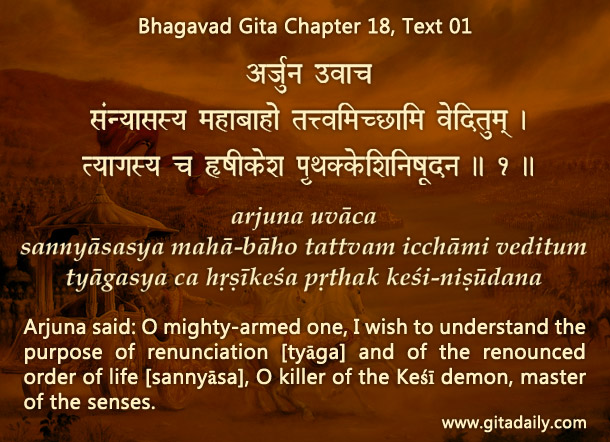At the start of the Bhagavad-gita’s final chapter (18.01), Arjuna asks a question that may be puzzling in both content and context. Content because he enquires about the imports of two similar-sounding terms: sannyasa and tyaga. And context because this question seems to have no link with the preceding verses — the two terms don’t occur in the entire previous chapter.
How can we comprehend the content of the question? By seeing how Krishna answers it (18.02). Krishna immediately understands the technical sense in which Arjuna has used those two terms. Accordingly, he explains their different imports: sannyasa refers to the external renounced order wherein one gives up one’s duties in the world; and tyaga refers to internal detachment from the results of one’s work. Interestingly, after Krishna differentiates these two words technically, he reveals their interchangeability in their generic meaning of ‘giving up’ — he states (18.07) that the renouncing (sannyasa) of prescribed duties out of illusion is being detached (tyaga) in the mode of ignorance.
And how can we comprehend the context of Arjuna’s question? By seeing it in the Gita’s overall context. At the Gita’s start, Arjuna was torn between two options: fight and become entangled in the bad karma of killing his relatives or renounce and fail in his duty as a kshatriya. Krishna offered him a middle way: fight as a duty without attachment to the results (02.47). Thereafter, Krishna reinforced that theme of detachment-in-engagement from different perspectives: the karma-yoga perspective in the first six chapters (e.g. 03.30, 05.12) and the bhakti-yoga perspective in the next six chapters (e.g. 09.27, 11.33). Arjuna’s question suggests that he wanted to understand that theme from the jnana-yoga perspective presented in chapters 13-17.
One-sentence summary:
Arjuna’s eighteenth chapter question seeks to understand the technical difference between outer renunciation of action and the inner renunciation of attachment to fruits from the jnana-yoga perspective.
Think it over:
- What is puzzling about the content of Arjuna’s eighteenth chapter question?
- What is puzzling about the context of that question?
- How can we understand Arjuna’s question in content and context?
***
18.01: Arjuna said: O mighty-armed one, I wish to understand the purpose of renunciation [tyaga] and of the renounced order of life [sannyasa], O killer of the Keshī demon, master of the senses.
To know more about this verse, please click on the image


renunciation is great BHAKTI